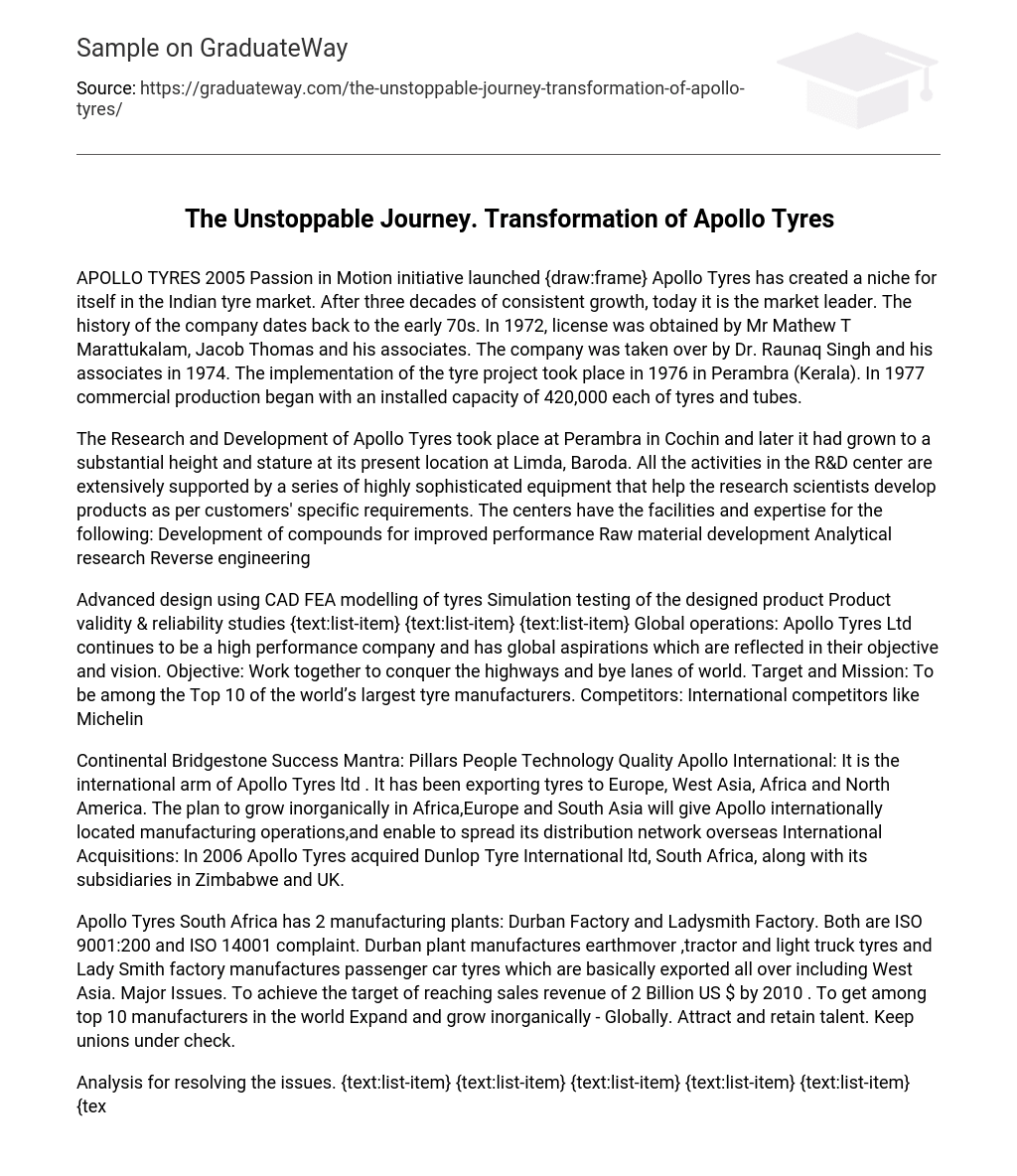Introduction
Apollo Tyres has created a niche for itself in the Indian tyre market. After three decades of consistent growth, today it is the market leader. The history of the company dates back to the early 70s. In 1972, license was obtained by Mr Mathew T Marattukalam, Jacob Thomas and his associates. The company was taken over by Dr. Raunaq Singh and his associates in 1974. The implementation of the tyre project took place in 1976 in Perambra (Kerala). In 1977 commercial production began with an installed capacity of 420,000 each of tyres and tubes.
The Research and Development of Apollo
Tyres took place at Perambra in Cochin and later it had grown to a substantial height and stature at its present location at Limda, Baroda. All the activities in the R&D center are extensively supported by a series of highly sophisticated equipment that help the research scientists develop products as per customers’ specific requirements. The centers have the facilities and expertise for the following: Development of compounds for improved performance Raw material development Analytical research Reverse engineering
Apollo Tyres Ltd continues to be a high performance company and has global aspirations which are reflected in their objective and vision. Objective: Work together to conquer the highways and bye lanes of world. Target and Mission: To be among the Top 10 of the world’s largest tyre manufacturers. Competitors: International competitors like Michelin
Continental Bridgestone Success Mantra
Pillars People Technology Quality Apollo International: It is the international arm of Apollo Tyres ltd . It has been exporting tyres to Europe, West Asia, Africa and North America. The plan to grow inorganically in Africa,Europe and South Asia will give Apollo internationally located manufacturing operations,and enable to spread its distribution network overseas International Acquisitions: In 2006 Apollo Tyres acquired Dunlop Tyre International ltd, South Africa, along with its subsidiaries in Zimbabwe and UK.
Both are ISO 9001:200 and ISO 14001 complaint. Durban plant manufactures earthmover ,tractor and light truck tyres and Lady Smith factory manufactures passenger car tyres which are basically exported all over including West Asia. Major Issues. To achieve the target of reaching sales revenue of 2 Billion US $ by 2010 . To get among top 10 manufacturers in the world Expand and grow inorganically – Globally. Attract and retain talent. Keep unions under check.
Recommendations
Inorganic Growth India’s biggest multinational tyre-maker, Apollo Tyres, has ambitious plans to double its turnover to US$2bn by 2010. Also in Apollo’s favour is that over 70% of revenues are generated in India where growth is expected to exceed 6% this year. In addition 75% of turnover is from the sale of commercial vehicle tyres.
With freight still moving, that core growth remains more or less unchanged. However, the company still faces challenges. In South Africa and southern Africa, where its portfolio is more evenly spread, growth has slowed. The off-road tyre business, which is supported mainly by the beleaguered mining industry, has been particularly badly hit. But the current environment is throwing up opportunities for non-organic growth and here Apollo is “taking a long hard look” at firms which are becoming more realistically valued.
Tyre report and with a turnover of US$1bn it makes sense for Apollo to gain scale in opportunity markets where it can use its natural advantages such as managing diversity and change. Its Dunlop acquisition in South Africa in 2006 is a good example of this. Indeed, the company has already expanded into Nigeria and will be selling Dunlop and Apollo products through its sales office there. South America too offers similar opportunities. Its recent foray into Sri Lanka is another recent example of its interest in emerging markets.
The market in Sri Lanka is similar to India. In considering opportunities for non-organic growth – which could be an entire business, manufacturing facility or distribution network – Apollo should use the same criteria it applied when acquiring Dunlop. It should look for firms with a reasonably strong presence in their domestic market, and which can be used as a base for export also. Next, the acquired firm should add to its existing technology basket. Finally, there should be opportunities for Apollo to improve manufacturing processes or the distribution network of its new partner.
Acquisition of rubber plantations for continuous and economical flow of rubber as it contributes to 70% of the cost. The top producers of rubber are Thailand, Indonesia and Malaysia. New markets Apollo should also explore new segments for tyres like Aviation and Space Industry, Formula Racing cars, Sand tyres, Tubeless tyres etc. which can give them competitive edge. In India, as GDP improves and Infrastructure develops, Apollo should increase capacity and strengthen dealer network for targeting the radial tyre switch over for the truckers and buses. Apollo should tie up for R with rubber institute and technology centres around the world.





